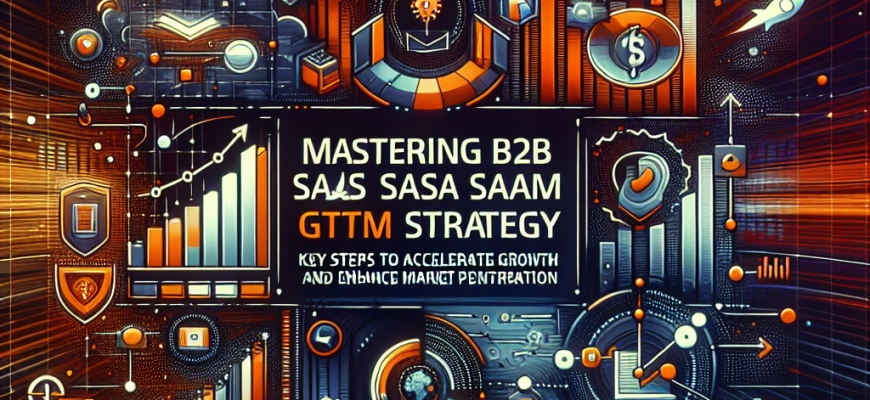- Mastering B2B SaaS GTM Strategy: Key Steps to Accelerate Growth and Enhance Market Penetration
- 1. In-depth Market Research
- 2. Clearly Defined Value Proposition
- 3. Segmented Targeting Strategy
- 4. Comprehensive Multi-Channel Marketing Plan
- 5. Customer-Centric Sales Approach
- 6. Robust Feedback Loop
- 7. Leveraging Automation and AI
- 8. Strategic Partnerships and Alliances
- 9. Scalable Customer Success Framework
- 10. Data-Driven Decision Making
Mastering B2B SaaS GTM Strategy: Key Steps to Accelerate Growth and Enhance Market Penetration
In the rapidly evolving landscape of B2B SaaS, developing a robust go-to-market (GTM) strategy is not just beneficial; it’s imperative for survival and success. As a digital marketing expert, I’ve observed and aided the transformation of numerous SaaS companies, helping them refine their GTM strategies to not only penetrate markets more deeply but also accelerate their growth sustainably. Here’s a deep dive into the key steps that can significantly enhance your B2B SaaS GTM strategy.
1. In-depth Market Research
The foundation of any effective GTM strategy lies in understanding your market. For B2B SaaS companies, this means diving deep into industry trends, customer pain points, and competitor analysis. Utilize tools like surveys, interviews, and data analytics to gather actionable insights. Understanding what drives your target audience, what solutions they currently use, and what gaps they feel exist, can position your product as the ideal solution.
2. Clearly Defined Value Proposition
What sets your SaaS product apart from the competition? Your value proposition should be clear, compelling, and directly address the needs identified during your market research. It should articulate why a customer would choose your solution over others. This clarity helps in aligning your marketing and sales efforts and creates a consistent message across all platforms.
3. Segmented Targeting Strategy
One size does not fit all, especially in the realm of B2B SaaS. Segment your market based on various criteria like industry, company size, user role, etc. Tailored messaging that resonates with specific segments increases the relevance and appeal of your product. This targeted approach not only improves engagement rates but also enhances conversion rates through personalized marketing.
4. Comprehensive Multi-Channel Marketing Plan
In today’s digital age, your prospects are scattered across various channels. A multi-channel marketing strategy ensures that you are where your customers are, be it on social media, search engines, or industry-specific forums. Each channel should have a tailored approach, utilizing its strengths to deliver your message effectively. For instance, LinkedIn might be ideal for thought leadership and direct engagement, while Google Ads could drive traffic based on specific search intent.
5. Customer-Centric Sales Approach
Sales in the B2B SaaS space is increasingly moving towards a consultative, customer-centric model. Sales teams need to be deeply knowledgeable about the product and the customer’s specific needs. Equip your sales team with tools and training to understand and navigate customer objections, and use a solution-selling approach that emphasizes how your product can resolve specific business challenges.
6. Robust Feedback Loop
Continuous improvement is key in a dynamic B2B SaaS environment. Establish a robust feedback loop that gathers insights from all touchpoints – customer reviews, support interactions, product usage patterns, and more. This data should inform every aspect of your GTM strategy, helping to refine your product and marketing efforts continually.
7. Leveraging Automation and AI
In the age of technology, automation and AI are indispensable tools for scaling your marketing efforts and enhancing efficiency. From automated email marketing campaigns to AI-driven customer insights and predictive analytics, leveraging technology can provide a significant competitive edge. It allows for more personalized, timely, and effective interactions with prospects and customers.
8. Strategic Partnerships and Alliances
Building alliances with other companies can help penetrate markets more deeply and reach audiences that were previously inaccessible. Whether it’s through integrations with other software tools or co-marketing efforts with complementary services, partnerships can broaden your reach and add additional layers of value to your offerings.
9. Scalable Customer Success Framework
As you acquire new customers, ensuring their success with your product is crucial for retention and upsell opportunities. A scalable customer success framework that includes onboarding, regular check-ins, and proactive support can enhance customer satisfaction and loyalty. Remember, a happy customer not only continues to use the product but is also more likely to recommend it to others.
10. Data-Driven Decision Making
Finally, anchor your GTM strategy in data-driven decision making. Use analytics to track the performance of different aspects of your GTM strategy, from marketing campaigns to sales pitches and customer engagement levels. This not only helps in identifying what works but also quickly highlights areas needing improvement.
By meticulously implementing these steps, B2B SaaS companies can not only accelerate their growth but also ensure that they remain competitive in a crowded market. Remember, a successful GTM strategy is not static but an evolving plan that adapts to new insights and market dynamics. Stay agile, stay informed, and keep your customer at the center of your strategy to truly master your B2B SaaS GTM approach.

A seasoned digital marketing strategist with over 8 years of experience across various areas of digital marketing, including SEO, SMM, PPC, content marketing, and email marketing. Specializes in transforming B2B, B2C, e-commerce, and SaaS businesses by creating effective go-to-market strategies and building thriving digital ecosystems. Known for a data-driven approach to optimizing campaigns and maximizing results.
“If your business is looking to scale or in need of a fresh perspective, feel free to contact”.


